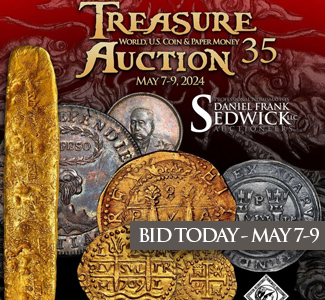By Ron Drzewucki – www.moderncoinwholesale.com ….
If you’re new to the hobby or just starting to get serious about coin collecting, some of the lingo can sound pretty strange.
And one word in particular may be the strangest of them all………. “Numismatics”.
It looks funny, and it’s kind of funny to say. “NOO-miz-MAT-tiks”… reminds me of when Seinfeld would hiss the name of his neighborly nemesis “Newman” on his 27-year-old sitcom.
But that’s not why it’s weird. No, it’s “weird” because while it’s the very name of our field of study, it’s hard to say what “Numismatics” is or what it means.
According to Webster’s Third New International Dictionary, the word “numismatic” ultimately comes from Greek via Latin and French. The Greek root word nomisma, says Webster, means “custom, usage, currency, coin” – and, if you think about it, that’s more or less how we use the word “coin” today.
Without getting too deep into the definition of “money”, I think it’s clear that all these different uses of the word center around coins because, for most of the time since they were invented around 600 BCE, coins were money. Studying coins was studying money, and so the study of less common forms of money was just folded into what eventually came to be called Numismatics.
There was simply no need to call the study of less common forms of money anything else.
So in a way, questions or confusion about what “Numismatics” is were deferred until fairly recently, when cash (and fiat money) became king.
Part of that confusion is due to the fact that we use the term rather casually. Sometimes a dealer, writer or collector will say “Numismatics” and mean the scholarly study of coins: their history and provenance, manufacturing techniques, etc. Then the same dealer, writer or collector will turn around and use the word to mean coin collecting as a hobby. But make no mistake, a word like “Numismatics” doesn’t get derived from the Greek just to mean collecting cool coins; It originally had more to do with the academic side of things.
Of course, that’s not how common usage treats it.
But I’m fine with that (you probably are, too). I don’t think anyone’s really flabbergasted by the dual usages, and so I will officially announce my neutrality on the subject of a strict definition.
If only that were the end of it, however.
Let’s get back to the idea that “money = coins”. That state of affairs has been changing for a long time. Long enough for “less common” forms of money to become a lot more common – common enough to be collected by the average Joe. And once a hobby has an large enough audience, that hobby needs a name.
So that’s why within Numismatics we have fields such as Notaphily, the study of bank notes and other paper money; Scripophily, the study of physical stocks and bond certificates; and Phaleristics, the study of military orders, medals, and decorations.
People who collect medals are called medallists. Folks who collect transportation tokens are called vecturists. All of these numismatic “subcultures”–and all sorts of subcategories that don’t have official, one-word names yet–fall under the category of Exonumia.
And Exonumia – a very large, very vibrant part of Numismatics – means, of course, “outside of Numismatics”.
This is reason number two the word “Numismatics” is so strange.
“Exonumia” itself, however, wasn’t around until about 1960, when token expert and soon-to-be Coin World editor Russ Rulau coined the phrase. The word has stuck since then. The post-war boom in coin collecting most likely had something to do with the relatively recent need to distinguish the “numismatic” study of medals and tokens from the “numismatic” study of coins and paper money (which Rulau himself included under Numismatics).
On the other hand, and on the other side of the Atlantic, the British had been calling the same field Paranumismatics. I’m assuming that the need for a new term arose in the United Kingdom earlier than in the United States because Numismatics itself was a more mature field in Britain and had had longer to develop.
So if you’re a budding numismatist-slash-coin-collector and you’ve given it a second or third thought, where does this all leave us? I’ll step up and throw my spin on it:
“Numismatics” means coin collecting (the fun part) AND the study of coins (the nerdy part, which is also fun).
Numismatics / Coin Collecting / the study of coins involves pretty much anything that’s either coin-shaped and or can be or has been used as money. I like to think it’s because numismatists-slash-coin-collectors are naturally curious, and one interesting coin always leads to another.
Sometimes we need to talk about just medals and tokens, or just bank notes, etc. etc. In these cases, we have words that mark off certain subsets of Numismatics. If anything, it’s terms like “Exonumia” and “Paranumismatics” that need work. So ignore them.
(The words, not tokens and medals. Tokens and medals are awesome and you should collect them.)
Besides, whether you call it Numismatics or Coin Collecting – everyone knows what you mean. You’re free to pick one or the other, or both!
Now, if only someone can tell me if it’s a “hobby” or an “industry”…
-Ron
